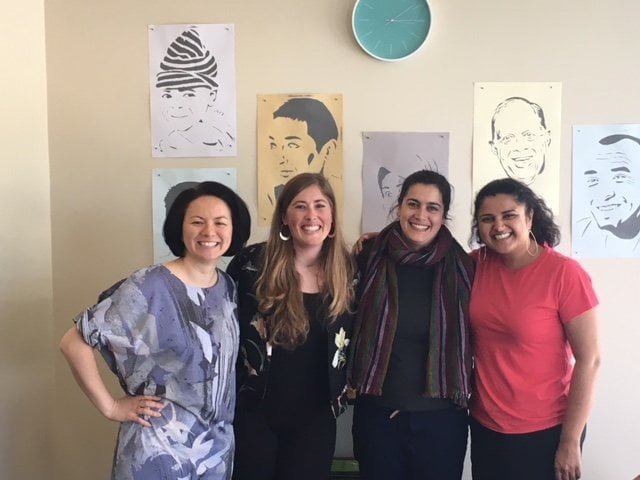Better Than Most is a regular feature of The Business of Giving, examining the best places to work among social good businesses and nonprofit organizations.
Denver: And tonight, you’ll be transported out to Palo Alto, California into the offices of the Peery Foundation. Their mission is to strengthen youth and families to build lives of dignity and self-reliance. Let’s hear from some of the members of the staff on why they believe it is such a special place to work.
Jocelyn: We are here to make the world a better place, and that is another thing that really binds us all together. I think what is truly critical for our secret sauce is the fact that we care about each other personally and professionally. We talk about we’re a small family foundation. Once somebody joins the team, welcome to the family but there is a family within the staff as well. That really helps with motivation to come to work every day because we love the people that we work with.
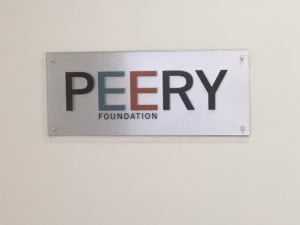 Jessamyn: There are so many aspects of our work that are not solid concrete, determined, consistent, and we constantly wrestle with that together, and we constantly say we don’t know if this is going to work. We don’t know if our board will like this. We don’t know if this is the right thing or the right interpretation of what the community has told us they want. We don’t know if this grant will get approved. But we say we are going to take that leap together. I think that again allows us to enjoy our work and really wrestle with more new ones that comes with the work of supporting organizations.
Jessamyn: There are so many aspects of our work that are not solid concrete, determined, consistent, and we constantly wrestle with that together, and we constantly say we don’t know if this is going to work. We don’t know if our board will like this. We don’t know if this is the right thing or the right interpretation of what the community has told us they want. We don’t know if this grant will get approved. But we say we are going to take that leap together. I think that again allows us to enjoy our work and really wrestle with more new ones that comes with the work of supporting organizations.
Avani: I’ve been able to be comfortable feeling vulnerable which is almost an oxymoron. But I think being able to be vulnerable in the workplace has allowed a greater sense of trust in the office, and I think that when I think about my friends in life, I think about my coworkers. I think that is a big part of the culture here is that we really truly think about each other’s as humans first and as portfolio director, portfolio associate, whatever, second.
Karelli: One is that in my own experience interviewing, I have never experienced an interview in the same way that I interviewed with the Peery Foundation. I felt like I was hanging out with people who really just wanted to get to know me which the team will probably tell you. That was not what I was ready for. My answers, what I really wanted to tell you, and there were like; no, we just want to know who you are. I remember one of the very first questions that Jessamyn asked me was, what’s something about one of my parents thought that I loved and really inspires me and that I would like to take with me. Not usually the first question that you’re asked in an interview. But it meant so much to me. It meant so much to me that I was able to share about someone in my life who’s so important to me and really allowed me to share what I feel is important about me as a person and what I would be able to really call on to do this type of work whether it’s both internally and externally. That’s a very distinct memory.
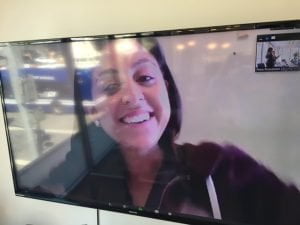 Jessamyn: MC stands for mental coach. Essentially, each member of the team mentors another member of the team, and it’s not hierarchical at all. It goes across the team and everybody both is an MC and is MC’d by somebody else. My MC is Natalia, our assistant, and she is one of the wisest people on this planet. I cannot tell you how much it means to be able to have an hour every month where she is in a facilitation role. Basically, the MC role is to be a Socratic facilitator. So, the MC asks you questions, and they help you unearth challenges and solutions to those challenges that are happening that are related to your role and your work. Having somebody who not only understands deeply what is happening, what the weather is in the Perry Foundation office, but somebody also who I don’t really work with that much and so is removed enough to be able to say; well, have you thought about it from this angle or why do you think you’re feeling that way? And just comes at it from a more removed perspective but incredibly supportive is very important to me.
Jessamyn: MC stands for mental coach. Essentially, each member of the team mentors another member of the team, and it’s not hierarchical at all. It goes across the team and everybody both is an MC and is MC’d by somebody else. My MC is Natalia, our assistant, and she is one of the wisest people on this planet. I cannot tell you how much it means to be able to have an hour every month where she is in a facilitation role. Basically, the MC role is to be a Socratic facilitator. So, the MC asks you questions, and they help you unearth challenges and solutions to those challenges that are happening that are related to your role and your work. Having somebody who not only understands deeply what is happening, what the weather is in the Perry Foundation office, but somebody also who I don’t really work with that much and so is removed enough to be able to say; well, have you thought about it from this angle or why do you think you’re feeling that way? And just comes at it from a more removed perspective but incredibly supportive is very important to me.
Avani: The more that we keep personal and professional in this completely separate isolated buckets, the harder it is to actually do the work every single day because you’re trying to break through these layers or these barriers that we create between personal and professional. It actually makes the work that much harder because I think in order to do good work well consistently, it has to be trust-based, and when you have these other layers interfering, it takes so much longer and, it costs more. The longer I thought about this, and Jessamyn and I have had conversations over the years about this; no, that’s just what you’re meant to think because we have home, and we have work and of course these places should be separate but in terms of how we show up, I think that we are able to do what we do at a high level because we take a human-centric approach and how we approach each other and how we treat and approach people externally too.
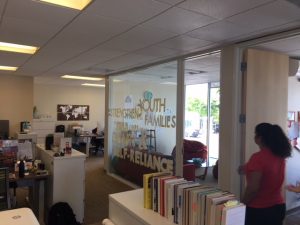 Karelli: One very specific question that we’re asked is what is our anxiety level for the week? That for me is so important in that it gives me the space to think about what is my anxiety level? 0:29:41.0 thought about it, it also gives me the space to share with my team so that if I need help or I need to think about what I need to make sure that I’m well, I have the space to do that. The third thing about is it allows me to do the same for my teammates. If we know that someone is a 9/10 that week, let’s figure out why that is. How can we support one another in making sure that we’re staying more at a 3 to 5 level which is usually our ideal.
Karelli: One very specific question that we’re asked is what is our anxiety level for the week? That for me is so important in that it gives me the space to think about what is my anxiety level? 0:29:41.0 thought about it, it also gives me the space to share with my team so that if I need help or I need to think about what I need to make sure that I’m well, I have the space to do that. The third thing about is it allows me to do the same for my teammates. If we know that someone is a 9/10 that week, let’s figure out why that is. How can we support one another in making sure that we’re staying more at a 3 to 5 level which is usually our ideal.
Jocelyn: Annual reviews are regularly and incredibly stressful experience. I find them to be stressful. It has nothing to do with the environment here because the way that Jessamyn has set them up is incredibly compassionate and not intrusive, not critical. It’s truly, how can you be a better person, better employee. Just because of who I am, I get stressed out and so I started bringing food. Let’s all eat some cupcakes while we do this annual review. Or let’s go get some ice cream afterwards, and let’s really; one of the heavier, major points of our year, let’s turn it into something fun. Now, it’s turned into – we bring treats to annual reviews now, and it’s really a conversation about the individual who’s being reviewed and it’s not this kind of barrage of criticisms. It’s really, it’s pretty fun.
Jessamyn: One thing we’re trying to do that is new is 90% celebrations. Instead of waiting until a project is 100% complete and finish, when we are approximately 90% of the way through doing a project or a task, that’s when we have the celebration. The idea behind that is, one, sometimes you don’t even know when you’ve actually finished a project. It just bleeds into the next one. Sometimes we haven’t celebrated in the past. And then other times, you need that team buoyancy, that energy to say, you’re doing so well, and this is so great! To get you through that last 10% because it could be the most grueling and challenging. That’s something we’re trying and figuring out.
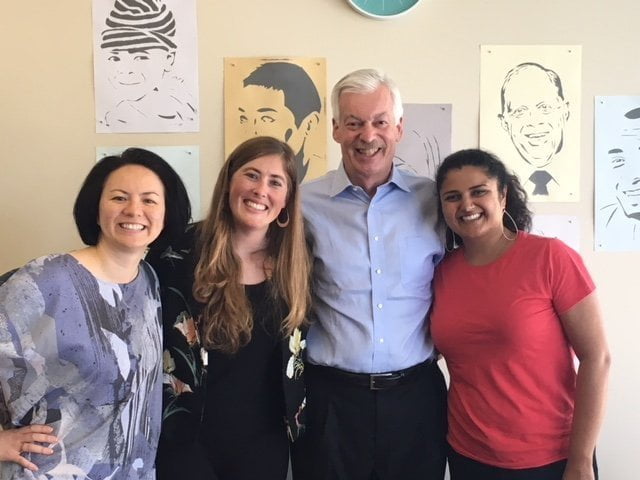
Denver: I want to thank those who participated in this segment: Karelli Cabral, Jocelyn Curran, Avani Patel, and their Executive Director, Jessamyn Shams-Lau. To hear this again, read the transcript or see pictures of the participants and the offices of the Peery Foundation, simply come visit denver-frederick.com.
The Business of Giving can be heard every Sunday evening between 6:00 p.m. and 7:00 p.m. Eastern on AM 970 The Answer in New York and on iHeartRadio. You can follow us @bizofgive on Twitter, @bizofgive on Instagram and at http://www.facebook.com/BusinessOfGiving

